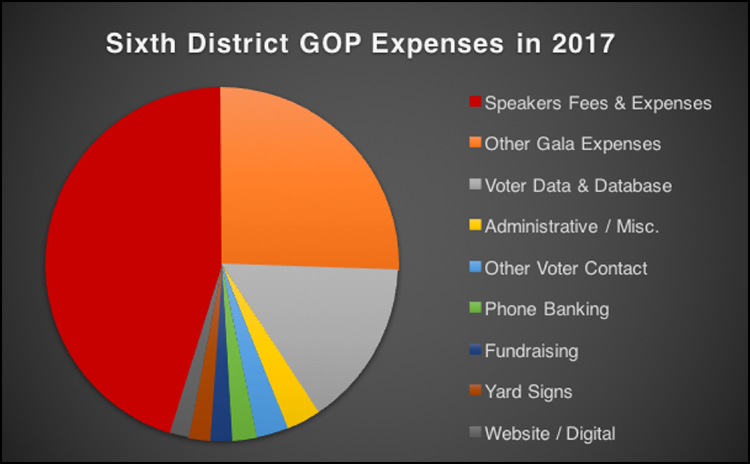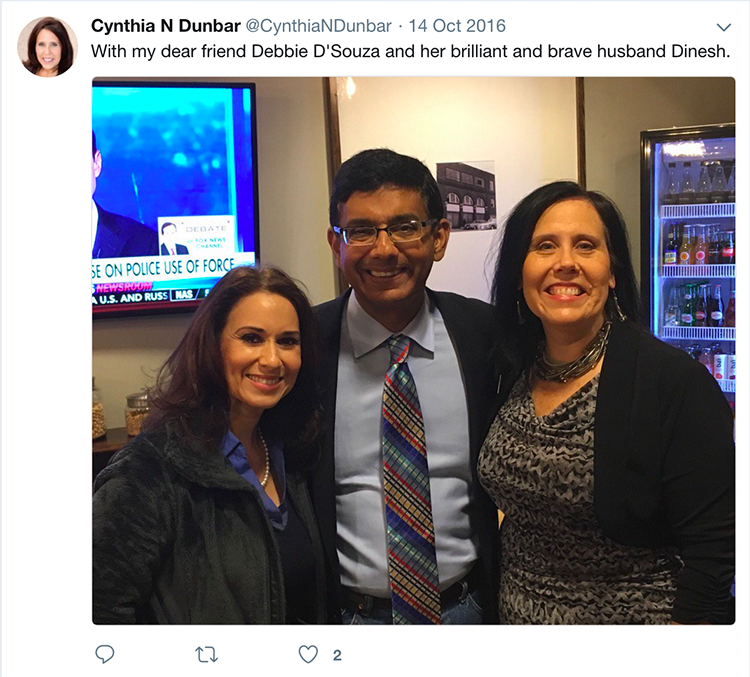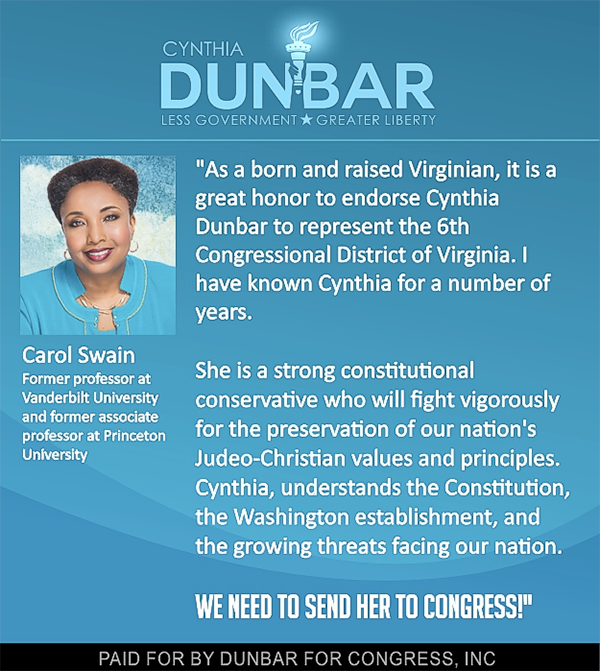By James Harrison
As a leader of the Sixth District GOP, it appears that Cynthia Dunbar used her position to help steer $20,732 in committee funds towards two of her personal friends and supporters as “Speaking Fees” for their appearance at a party event, according to state campaign finance records available through VPAP [1].
The payments, which represent nearly half of the district’s 2017 budget, were made without Dunbar disclosing her personal conflict of interest to other committee members, as required under Article VII, Section J(2) of the State Party Plan [2].
In 2017, the Sixth District GOP, under the leadership of Chairman Scott Sayre, Cynthia Dunbar, and their allies, spent nearly $46,000 as follows:

Sayre and Dunbar’s questionable spending alone is grounds for new leadership in the district. While GOP statewide campaigns struggled against better-funded Democrats in 2017, Sixth District leaders spent nearly three-quarters of the year’s take throwing a “fundraiser” instead of buying signs or opening more phone banks to get Republicans to the polls.
Of that fundraiser, nearly two-thirds of its entire budget was spent paying speaking fees to Dunbar’s friends.
One was Dinesh D’Souza.
Dunbar, who has known the D’Souzas and worked with them since her time in Texas politics, described D’Souza’s wife as a “dear friend.” [3]
The other speaker Dunbar hired was Carol Swain, who endorsed Dunbar’s campaign for Congress on April 10th [4].
The arrangement appears to have begun when district Chairman Sayre gave Dunbar – who was at that time on his company’s payroll [5] – a leadership role in planning the 2017 District Gala, a fundraiser intended to bring in money for election efforts.
Dunbar, with Sayre’s approval, then paid $20,732 in speaking fees and expenses to the two speakers.
The 2017 Sixth District Gala
The 2017 Sixth District Gala [6] was held on April 15, 2017, at the Stonewall Jackson Hotel & Conference Center in Staunton, VA, and represented the bulk of the Sixth District’s annual fundraising.
According to VPAP, in 2017, the committee brought in a total of $42,249 in total cash contributions from all sources, although only $18,999 of this came from sub-$1000 grassroots contributors.
The rest came from two sources: The first was major donors like Walter Curt and Bill Holtzman, who invest in district efforts because they care about winning in the 6th, rather than seeing program speakers. The second came from GOP candidates buying ad space in the gala’s program, which ends up essentially costing the grassroots twice — the money they donate to candidates went back to the committee in the form of ad buys.
Major donors and campaigns will give money regardless of the program speakers or the quality of the dinner’s steak or wine. All of the fun and excitement brought by headlining speakers is necessary only for selling tickets to bring grassroots supporters in the door as attendees. Major donors may like being recognized at the program, but it is not why they give thousands or more at a time. Thus, a headliner needs to be a big enough draw to cover whatever the cost of getting them to the event, if any.
Or, in other words, successful committees must make events profitable from average ticket sales, rather than using Ed Gillespie’s money subsidizing a party for everyone.
By that measure, the gala raised no more than $18,999 from grassroots contributors on $32,496 in total expenses. That is a tremendous fundraising failure, especially when considering that the gala would have made money if Dunbar hadn’t given 2/3 of the gala budget to her friends. A gala with no headliners would have raised money on major donor and campaign ad sales alone.
In fact, according to committee finance records [7], this is the first time the Sixth District Committee has ever paid to bring in a guest speaker, a practice usually associated with statewide galas or high-dollar fundraising retreats. Normally, party leaders work their own contacts to find a speaker for free. As an RNC national committeewoman, Dunbar is especially well-connected with potential free speakers across the country – so why did she pay when so many political types are willing to get up and speak endlessly for free?
Let’s be clear about one thing: hiring a guest speaker for a district committee’s gala – for any dollar amount – is extremely unusual. Paying thousands of dollars for that speaker is even more unusual. Dunbar did it twice. In one year. Both are personal friends.
According to the 6th District website and information provided to potential donors, Cynthia Dunbar, at the pleasure of Scott Sayre, her employer and political patron [5], was one of the leaders responsible for the Gala.

Dunbar’s Entangled Relationships
While the wasteful spending on a failed fundraiser is a huge problem itself, the continued ethical problems surrounding Dunbar and her candidacy should give Sixth District Republicans pause.
Back in January, the 6th District was accused of rigging the convention rules in Dunbar’s favor [8], allowing a weaker candidate (such as herself) to win with less than a majority vote. RPV’s State Central Committee overturned the attempted rules hijacking, finding it violated party rules. [9]
Dunbar’s campaign then faced credible accusations that it received advance access to valuable convention delegate lists [10], ahead of the other campaigns – an action which broke party rules yet again. [11]
Records also showed that Dunbar was on the payroll of Chairman Sayre’s company [5]. In response, Dunbar declined to specify exactly how much she was paid by Sayre or what she did for his company.
These latest findings regarding the gala and its questionable expenses will likely raise even more ethical questions regarding Dunbar’s relationship with the 6th District Committee. Both the steering of speaking fees to friends and supports, and the failure to disclose those relationships to the full committee represent further evidence of questionable behavior on the part of Dunbar and her supports on the committee.
As an aside, the $15,000 (excluding expenses) which was paid to D’Souza could have bought nearly 11,000 signs for Sixth District Republicans.
Here’s Dunbar with that “dear friend.” [3]

If that were not enough, Dunbar apparently repeated the process twice in the same event, paying thousands more to fly Carol Swain to southwest Virginia as the event’s second speaker.
It was thus unsurprising to see Swain endorse Dunbar for US Congress [4] on April 10, 2018.

That this happened twice raises even more ethical questions about the gala, its planning, and its oversight.
This Appears to Break Party Rules
These payments of party-raised donor money from the 6th District Committee to friends and supporters of Cynthia Dunbar raise a key question as to whether she properly disclosed this financial arrangement. Under Article VII, Section J(2) of the State Party Plan [2], voting members of district committees have a duty to disclose conflicts of interest as follows:
“Recognizing that not all possible conflicts represent an actual conflict of interest, voting members of the State Central Committee and District Committees shall voluntarily disclose, in writing, any known potential or actual conflicts of interest to all members of the official committee on which they serve in a timely manner after becoming aware of such conflict.”
As national committeewoman resident in district, Dunbar is herself a member of the Sixth District GOP, under the committee’s bylaws [12] [Art. III, Sec. (A)(1)(e)(iv)].
This duty falls on Dunbar to disclose. It does not require opponents to raise an objection.
According to reports, Dunbar did not disclose these conflicts of interest as required.
Last week, a GOP official accused Dunbar’s campaign of breaking party rules [10] in gaining an unethical and prohibited advantage over her competitors by gaining advance, preferential access to delegate lists through her campaign employee, Matt Tederick, who stands accused of violating the same conflict of interest and transparency provisions as Dunbar.
Despite multiple allegations of unethical behavior, no action has been taken against Dunbar, Tederick or anybody connected with her campaign.
Given the lack of action, one thing is certain: Republicans should not look towards the Sixth District GOP for an honest and impartial investigation of the charges leveled against Dunbar. Given the relationship between 6th District Chairman Scott Sayre and Dunbar, any 6th District level investigation would suffer from the same conflicts of interest that already exist, and would raise the appearance of impropriety, even if none actually exists.
With all of these issues continuing to swirl, it seems likely that RPV’s State Central Committee will need to step in and determine what, if anything, can be done to address these concerns in the 6th District.